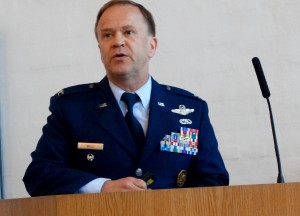2015-04-30
At the Copenhagen Airpower Symposium hosted by the Centre for Military Studies and the Williams Foundation on April 17, 2015, Col. Bernard “Jeep” Willi, Combat Air Branch Head of the NATO Joint Air Power Competency Centre (JAPCC), provided an overview of the role and current work of the JAPCC.
The JAPCC is a NATO center of excellence for the study of airpower with the aim of enhancing the capability of the coalition to work together effectively.
According to the JAPCC publication Fast Facts:
The Joint Air Power Competence Centre (JAPCC) was formed on 1 January 2005 to provide a strategic level proponent for Joint Air and Space (A&S) Power that was missing in NATO.
Soon thereafter JAPCC was accredited as NATO’s first Centre of Excellence (CoE) and, as such, is charged with the development of innovative concepts and solutions required for the transformation of A&S Power within the Alliance and the Nations.
The Director of the Centre is General Frank Gorenc, Commander, U.S. Air Forces in Europe; Commander, U.S. Air Forces Africa; and Commander Allied Air Command.

Col. Willi highlighted the various activities of the JPAC and focus research areas.
Among current studies are examining the challenges for remotely piloted aircraft systems for operating in contested environments and how the shift from operating in Afghanistan to a more robust combat environment will affect their viability and usability.
JAPCC-RPAS-Operations-in-Contested-Environments
The center is also looking at challenges such as disinformation campaigns against the use of NATO airpower, a study that recognizes the information war aspect of 21st century operations.
The impact of new systems, like the A400M, the F-35 and the tanker will also have their impact on coalition capabilities and operations are will be undoubtedly a key focus of attention for evolving studies by the JAPCC.
At the previous Airpower symposium hosted by the Centre for Military Studies in November 2014, Lt. Gen. “Freek” Muelman of the Royal Netherlands Air Force discussed the JAPCC’s largest project to date, the Future Vector Project: Air and Space Power in NATO.
The project examined the “paradox” that political leaders in NATO have been increasingly willing to call upon airpower to achieve their objectives but have been unwilling to invest in replacing old and increasingly obsolete airpower platforms and systems, and, indeed, have seen reducing the size, scope, and sophistication of their air forces as a means to pay the bills for operations in Afghanistan within their defense budgets and to soften the impact of the 2008 financial crisis on their social welfare systems in general.
Highlighting these sorts of problems and giving them the imprimatur of NATO is among the JAPCC’s unstated functions.
In short, the JAPCC is a resource that smaller and larger air forces can use to help sort out ways to enhance the congruence of operational capabilities.

